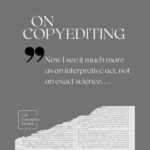
Assistant Editor Maggie Su: All three sections of Janika Oza’s “Lifeboat” revolve around food—as sustenance, as survival, as a way to connect to a lost country. Food marks the displacement of the collective speakers as the pleasure of “guava, flesh scraped with baby teeth” is replaced with the need to “unhinge your jaw, consume whatever you’re given.” In the last section, the speakers’ desire for flavors from home is inextricably intertwined with a hunger for “a memory, a forgotten place, a distance too great to cross.” Wading into Oza’s richly textured prose, the reader’s immersed in the tastes of loss, survival, and longing.
To hear Oza read her story, click below:
Lifeboat
I
The only food on the boat was rice meal mixed with water, liquid murk not enough to call porridge. Better that than the nausea of black waves, the acid of emptiness, the boy who asked his mother for yogurt and dates from a mouth crusted with seasick. The only food in the labor camp is rice boiled to slurry, set with small stones and prized nodes of salt. Better than the rice meal, we say, as the plantains hang fat and green from the trees, as the British dip butter toast into cups of imported Indian tea. The only food in exile is everything we never dreamed: potatoes fried into oily smiles, white pillows of bread, noodles thick as thighs. We drink tea, make toast, mash plantains, boil rice. Heads low to the table, we ferry food from plate to mouth, unable to imagine what might be better.
II
You tell me that in the beginning you ate peda offered from the temple, orbs of sugar and sun-warmed milk rolled by hands bigger than yours. Then guava, flesh scraped with baby teeth, the insides of a coconut, its gutted body cupped in your lap. Then one day, crickets—fried, oil-crisp, wings stiff and light as eyelashes. You tried them just once, to see if you were African. You found yourself wanting, the crickets drowning in bile and fruit flesh on the bathroom tile. The next day you found yourself exiled, fleeing a country that spat you into the ocean, teeth from a broken mouth. You, being a child, thought it was the crickets, that you had taken something that wasn’t yours. You do not consider what they took from you: the ground beneath your feet, your unborn future. In the next country you swallow your memories, unhinge your jaw, consume whatever you’re given, aching, longing, too hungry to look back.
III
Give me the salted papaya, the mango slice rubbed with a triangle of lemon. Give me the peanuts slick with pepper paste, the peanuts boiled in salt water, the peanuts floating lifeboats in dal. Give me the whole fruit, the whole seed, the whole plate. Let me fill my mouth with longing for what we lost and found again, let me reach out my hand and grab for more. We sit around the table eating everything we can’t find. Gorging on survival, something that is our own. A memory, a forgotten place, a distance too great to cross. We inhale and swallow, we eat and eat and refuse to be empty. A wedge of lime in one hand, a rope in the other.
Janika Oza is a writer based in Toronto. She was the winner of the 2019 Malahat Review Open Season Award in Fiction and has received fellowships from VONA, Tin House, and One Story. She is published or forthcoming in Guernica, The Best Small Fictions 2019 anthology, Hobart, SmokeLong Quarterly, and elsewhere.
For more miCRo pieces, CLICK HERE










